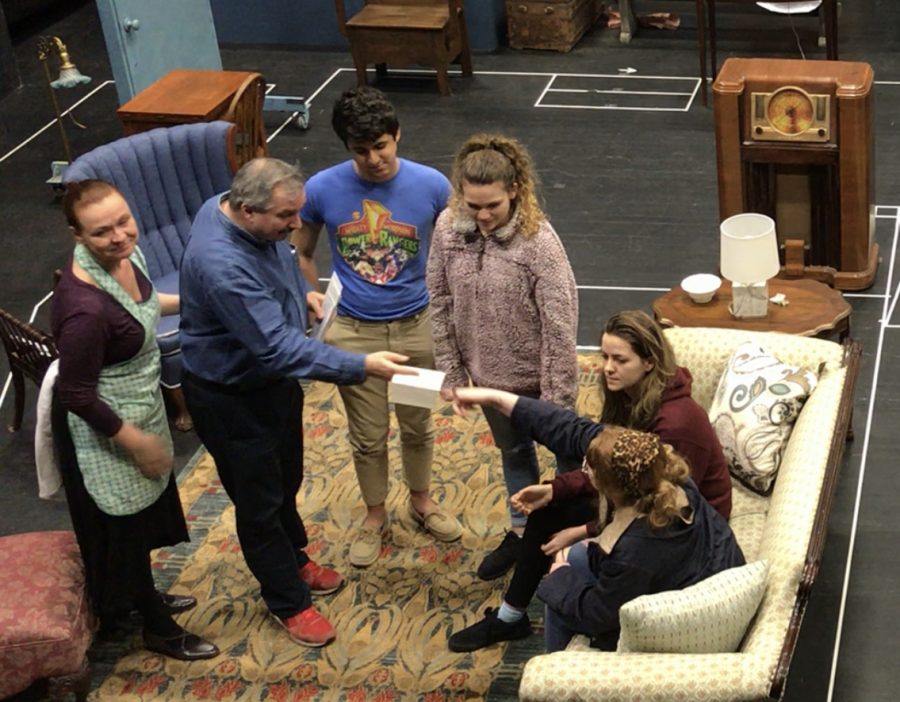Play to feature family drama, coming-of-age
The cast of “Brighton Beach Memoirs” rehearses a scene with Equity Actors Laurie Dawn and Buzz Roddy.
People normally hide their awkward sides, but this was not the case for Eli Young, who tapped into his inner awkwardness for his upcoming role as a teenage boy going through puberty.
The USI Theatre Department is continuing its season with “Brighton Beach Memoirs.” The play is a comedy coming-of-age story centered around Eugene, a Polish Jewish teenager living in Brooklyn during the 1930s. Performances will be at 7 p.m. Feb. 13-15 and 2 p.m. Feb. 16 in the Performance Center.
The story is about Eugene going through puberty, sexual awakening and a quest for identity all while dealing with the extended family moving in after a recent death.
The play is written by Neil Simon, an American screenwriter and playwright, and is part of USI Theatre’s annual Repertory Project which operates under a contract with the Actors’ Equity Association. The Actors’ Equity Association is a union of professional actors and stage managers.
Two professional actors, Laurie Dawn and Buzz Roddy, will play the role of Kate and Jack, the parents of the family. Union stage manager, Margaret Kayes will also help with the play.
Young, a junior theater performance major, plays Eugene and describes his character as an imaginative and creative person because of the scenarios he creates in his head about baseball, writing and family.
Young had to make a lot of preparations for the role, including adopting an accent and learning about baseball. He said he had to tap into his younger self to prepare for the role.
“I just really had to bring myself back because, being in a college setting, it feels like so long ago that you were learning about these kinds of things,” Young said.
Stanley, Eugene’s older brother, has struggles of his own with his job. Jovanni Olavarria, a junior theatre major, plays Stanley and said he relates to his character in regards to having to grow up fast and assume a fatherly role in the family. Olavarria chose to go into acting because he enjoyed creating and telling stories despite some hardships he faced when he was younger.
“It almost feels like I’m a kid again when I’m acting because I’m just pretending and telling stories and I think that’s my driving force,” Olavarria said.
Laurie, Eugene and Stanley’s younger cousin with heart problems is played by Kierstin Prewitt, a sophomore theater and social work major. Prewitt said she relates to her character because they have a lot of things in common.
“I relate to her in the way that she is very book smart, likes to correct people, and kind of be like a know-it-all and I definitely did a lot of that when I was younger,” Prewitt said. “We also share somewhat of a same thing. She has a flutter in her heart and I have a heart murmur so I think that’s cool.”
Other characters in the play are Eugene and Stanley’s parents, Kate and Jack, Kate’s sister, Blanche and Blanche’s other daughter and sister to Laurie, Nora.
Elliot Wasserman, director and chair of the performing arts department said this play was chosen to add variety to the theater season. USI has put on dramas and musicals in the past, so they decided to add a comedy. He chose this play because earlier this season, they put on a contemporary play called The Revolutionists and a Shakespeare play.
“Neil Simon is one of the 20th century’s greatest comic playwrights and Brighton Beach is considered one of his finest plays,” Wasserman said. “So it’s very appropriate that we choose something and offer it.”
Wasserman said the set of the play is unique because it has two stories. He said he chose to do this for a more realistic effect because he wanted it to feel as though you were back in 1937. Paul Weimer, the scene designer and assistant professor of theater, drew inspiration from pictures taken in Brooklyn during the 1930s, online research and his own experiences of living in Brooklyn.
Weimer said he worked hard to design a set where audience members would be transported back into a small home where the presence of family members is always felt. He tried to capture the annoying yet loving dynamics of extended family living together in a small house.
“Yes, it takes place in the past but I think it deals with a lot of issues that young people can relate to about wanting to break free of your family and be independent,” Weimer said. “Growing up and having kind of love/hate relationships with your siblings and your parents and how we often kind of lovingly torture each other in our family and I think that the play sort of makes that clear.”
The central message of the play is family and the dynamics of having extended family move in. The play also deals with the reality of coming-of-age which ties into the family aspect.
“Ultimately, no matter what happens around you, you need love to continue your days,” Young said. “I don’t think the main message is Eugene’s coming of age, in the end, it’s a full wraparound with the entire family. If there’s one person out of the family that’s gone, they’re missing a lot of support. So they really depend on each other and it’s very important that at the end of the day they all stick up for each other.”



